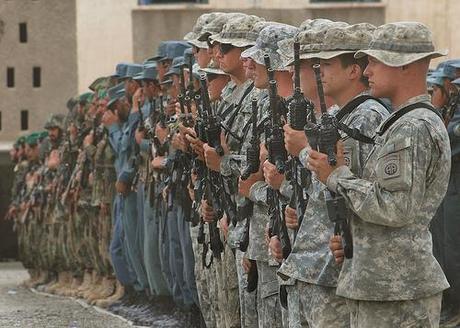
US troops in Afghanistan. Photocredit: The US Army http://www.flickr.com/photos/soldiersmediacenter/768971192/sizes/m/in/photostream/
A new incident of American troops behaving atrociously in Afghanistan has come to light. A photograph of American soldiers posing whilst Afghan police hold up the severed legs of what is allegedly a suicide bomber has provoked outrage, reported the LA Times. The 18 photos were taken two years ago by the US 82nd Airborne Division in Zabul Province and were handed to the LA Times by a whistleblower who said that the photos indicated a breakdown in discipline that was compromising the safety of troops. The Pentagon had asked the LA Times not to publish the photographs, but the paper decided it was in the public interest to do so. This comes as Nato chiefs in Brussels are planning to reduce army numbers in Afghanistan by 2014. Whilst a CIA agent, Robert Baer, is calling this an isolated incident (see here on Periscope for other “isolated incidents”), everybody is condemning what happened.
The Times reported that Leon Panetta, the US Defence Secretary, has apologised for the actions of the soldiers, and has insisted that these photographs do not reflect the behavior of the majority of US soldiers in Afghanistan. The LA Times reported that Afghans seemed “more disgusted and saddened than furiously indignant.” President Hamid Karzai has yet to make a statement, whilst the White House has condemned the images. The US Army has launched a criminal investigation.
“We condemn Americans posing with dead bodies or body parts,” said Najla Dehqan Nezhad, a member of parliament from the western province of Herat, quoted on The Times.
What do the photos show? According to the LA Times, one shows a soldier in front of a body of an insurgent, with his eyes open, and what might be his hand on the soldier’s shoulder. Another shows a group of soldiers standing, holding up the legs of a corpse. One, not published in the paper, allegedly shows a man holding up a sign saying “Zombie Hunter” in front of the dead bodies.
What did the whistleblower say? The anonymous soldier told the LA Times that the soldiers in the photograph had felt “a sense of triumph and satisfaction” at the deaths of the suicide bombers. “They were frustrated, just pissed off — their buddies had been blown up by IEDs. So they sort of just celebrated.”
What do the US and Nato say? “This is war, and I know that war is ugly, and it’s violent,” Leon Panetta said at a NATO meeting in Brussels, Belgium. “And I know that young people, sometimes caught up in the moment, make some very foolish decisions. I’m not excusing them, not excusing that behavior. But neither do I want these images to bring further injury to our people or to our relationship with the Afghan people.” The photos are “a serious error in judgment by several soldiers who have acted out of ignorance and unfamiliarity with US Army values,” NATO’s International Security Assistance Force said in a statement.
What do the experts say? CNN rounded up comment from military advisors. Former CIA agent Robert Baer said it was “an isolated event. It’s not the end of the world, but if it continues on like this – more bad news – we’re going to have a very, very difficult time stabilizing this country before 2014.” Retired army general James Marks said “Sadly, you had soldiers ostensibly dehumanizing the enemy. That can’t be done. You’ve got to hold these bad guys with respect that they deserve if they’re willing to kill themselves to achieve a goal … our soldiers understand this. These are several bad apples. You need to always respect your enemy, so you better understand them.”
Are there any positives? Retired General Wesley Clark said on CNN: “We’ve accomplished our major objective there. We got Osama bin Laden. We’ve taken strong measures against al Qaeda – it’s a broken organization, at least as it was in 2001. And it’s not going to recover, at least not in the near term there. There are other enemies on the ground there in Afghanistan, and it’s been a tough fight. So winning the hearts and minds? I think we can continue training Afghan security forces. I think we can expect to fulfill the obligations to [Afghan President] Hamid Karzai’s government. I think we’ll get an orderly withdrawal out of that region, as President Obama said, [in] 2014. That’s what we’re really looking for.”
What do the commentators say? Andrew Sullivan on The Daily Beast thought that it was a sign that this war had gone on too long. Under the headline “What Empire Does”, he wrote: “The sickening pictures speak for themselves. At what point will we recognize that inserting ourselves into places like Afghanistan and Iraq will change us, has changed us, and will change us. Mercifully, this latest inhuman excrescence is not government policy, as at Abu Ghraib. But it exposes even more deeply the inherent failure and moral corruption of occupying Afghanistan and the need to withdraw sooner rather than later.” Lexington on The Economist, however, disagreed with him, saying that it wasn’t an imperial war at all, and that the behavior of the troops had nothing to do with that. He pointed out that all wars have their atrocities. To pretend that this is not so is a fallacy.

